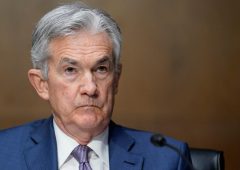Jerome Powell Commented on Future Rate Cuts – Here is What He Said
15.07.2024 21:15 2 min. read Alexander Stefanov
Jerome Powell started his recent interview with David Rubenstein by saying he won't give any hints on potential rate cuts or hikes.
He stressed that Fed wants to get this right, so that is why they aren’t in a rush for rate cuts before solid data, especially after the particularly weak Q1 reports.
Rubenstein asked when the time comes for Fed to cut interest rates, does Powell think that they will go back to years ago to the “free money period” when interest rates were almost zero.
Powell said that the period between global financial crisis (2007/2008) and the Covid pandemic was historically unusual with very low interest rates through that era.
“This also includes part of the era when for example sovereign debt of major european sovereigns was trading at a significantly negative rate. But even with rates that low, inflation was very low below target. The question is what caused that and if the forces that caused it are gone for now.”
According to Fed’s Chair most people attribute the low inflation era to slow moving forces like demographics, globalization and technologcal evolution, which may or may not have changed.
Nonetheless he is looking where the USA is at present:
“Funds rate is around 5.3% and feels like it is restrictive but not serverly restrictive. The neutral rate must have risen from where it was during thte intercrisis period. [Although I can’t prove that. the neutral rate is probably higher than it was then so rates will be higher.”
Rubenstein asked why did the ECB lower interest rates before Fed and whether it was because their economy is weaker.
Powell stated:
“The eurozone went through a signifcant period of very low growth while the US was growing at more than 3% last year so we are in a different place.”
Ideally he and the Fed don’t think that going up and down with the rates is an ideal option. That is why he wants to be sure before taking decisive action, based on solid data.
-
1
U.S. PCE Inflation Rises for First Time Since February, Fed Rate Cut Likely Delayed
27.06.2025 18:00 1 min. read -
2
Key U.S. Economic Events to Watch Next Week
06.07.2025 19:00 2 min. read -
3
Gold Beats U.S. Stock Market Over 25 Years, Even With Dividends Included
13.07.2025 15:00 1 min. read -
4
U.S. Announces Sweeping New Tariffs on 30+ Countries
12.07.2025 16:30 2 min. read -
5
US Inflation Heats Up in June, Fueling Uncertainty Around Fed Cuts
15.07.2025 16:15 2 min. read
US Inflation Heats Up in June, Fueling Uncertainty Around Fed Cuts
U.S. inflation accelerated in June, dealing a potential setback to expectations of imminent Federal Reserve rate cuts.
Gold Beats U.S. Stock Market Over 25 Years, Even With Dividends Included
In a surprising long-term performance shift, gold has officially outpaced the U.S. stock market over the past 25 years—dividends included.
U.S. Announces Sweeping New Tariffs on 30+ Countries
The United States has rolled out a broad set of new import tariffs this week, targeting over 30 countries and economic blocs in a sharp escalation of its trade protection measures, according to list from WatcherGuru.
Key U.S. Economic Events to Watch Next Week
After a week of record-setting gains in U.S. markets, investors are shifting focus to a quieter yet crucial stretch of macroeconomic developments.
-
1
U.S. PCE Inflation Rises for First Time Since February, Fed Rate Cut Likely Delayed
27.06.2025 18:00 1 min. read -
2
Key U.S. Economic Events to Watch Next Week
06.07.2025 19:00 2 min. read -
3
Gold Beats U.S. Stock Market Over 25 Years, Even With Dividends Included
13.07.2025 15:00 1 min. read -
4
U.S. Announces Sweeping New Tariffs on 30+ Countries
12.07.2025 16:30 2 min. read -
5
US Inflation Heats Up in June, Fueling Uncertainty Around Fed Cuts
15.07.2025 16:15 2 min. read


